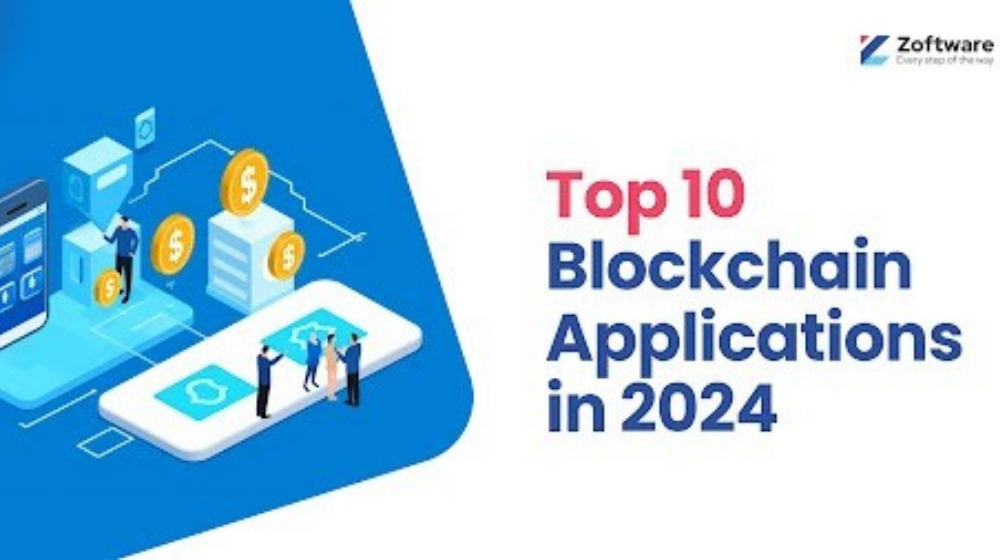Blockchain technology has been around for over a decade, and it has been making waves in various industries. Blockchain is a decentralized ledger system. It enables for safe and transparent transactions with the independence of not needing intermediaries. It can potentially revolutionize how we do business and interact with each other.
Understanding Blockchain technology is crucial to understanding its applications. A distributed database stores transactions in blocks that form a chain. Every block is provided with a unique code termed a hash, which is used to verify the authenticity of the data in the block. Once a block is added to the chain, it cannot be altered, making the system tamper-proof and secure.
With its safe and transparent nature, blockchain technology has found many applications in various sectors. From finance to healthcare, logistics to identity security, blockchain technology will upscale our way of doing business. Companies are using blockchain for everyday applications such as money transfers, smart contracts, IoT, and more.
Key Takeaways
- What is blockchain technology? a brief overview of the concept and its fundamentals with its current and potential applications.
- Understanding blockchain technology is crucial to understanding its applications in several areas like finance, supply chain, healthcare, logistics, and identity security.
- Companies are using blockchain for everyday applications such as money transfers, smart contracts, and IoT.
Understanding Blockchain
Blockchain was first introduced in the year 2008 as the fundamental technology for Bitcoin, but has since been adopted by miscellaneous industries for a variety of applications.
At its core, a blockchain is a series of blocks that contain digital information. Two blocks are linked together using cryptographic techniques, which further creates a chain of blocks. Not even a single block can be altered without changing the entire chain. This makes the information stored on a blockchain tamper-proof and immutable.
Blockchain has the ability to provide trust and transparency in transactions. Because the information on a blockchain is shared among all participants in the network, there is no need for a centralized authority to verify transactions. This can completely eliminate the risk of fraud and corruption, making it an ideal solution for industries like supply chain management, financial institutes, and healthcare.
Another advantage of blockchain is its ability to automate processes and reduce costs. By eliminating intermediaries and streamlining processes, blockchain reduces the time and cost associated with transactions.
Overall, blockchain technology can revolutionize the way we conduct business and interact with each other. As more industries adopt blockchain and explore its potential applications, we can expect to see even more innovative use cases in the future.
Blockchain Scalability
One of the major challenges facing blockchain adoption is scalability. It is the ability of a blockchain network to handle a rising number of transactions as traffic joining the network increases.
Blockchain scalability is a complex issue that involves several factors, including network throughput, latency, and consensus mechanisms. The scalability challenge arises because most blockchain networks have limited storage space and processing power, which can result in slow transaction processing times and high fees.
One solution to blockchain scalability is to increase the block size or reduce the block time, which allows for more transactions to be processed per second. However, this approach can lead to centralization, as only a few nodes with high processing power can handle the increased load.
Additional such as payment channels or sidechains, which allow for faster and cheaper transactions without overloading the main blockchain network. These solutions can help to reduce congestion on the main blockchain and improve network throughput.
Several consensus mechanisms have been proposed to address blockchain scalability, including Proof of Stake (PoS) and Delegated Proof of Stake (DPoS). These mechanisms use reputation or stake to validate transactions rather than large amounts of computational power, which can improve network efficiency and scalability.
In conclusion, blockchain scalability is a critical issue. So it is crucial to address this for blockchain technology to reach its full potential. While several solutions have been proposed, there is no one-size-fits-all approach to blockchain scalability. Developers must consider the trade-offs between scalability, security, and decentralization when designing blockchain systems.
Blockchain Applications for Business
Blockchain technology’s ability to provide greater trust and transparency leads to greater efficiency and security by eliminating duplication of effort. Below are some of the most promising blockchain applications for business.
Supply Chain Management
Introducing blockchain technology to the supply chain can streamline processes, reduce costs, and enhance transparency. It allows businesses to track products from the source to the end-user, ensuring authenticity, quality, and compliance. Blockchain-based supply chain management systems can prevent fraud, reduce delays, and improve inventory management.
Financial Services
Blockchain technology can bring a disruption in the financial services industry by providing faster, inexpensive, and more protected transactions. With blockchain technology, peer-to-peer transactions do not need any intermediaries, reducing fees and processing times. Blockchain-based financial services can also provide greater security against financial crimes like financial fraud, money laundering, phishing, etc.
Healthcare
Blockchain technology is enhancing the security and privacy of healthcare data by providing a tamper-proof, decentralized platform for storing and sharing sensitive information. It can also help streamline processes, reduce costs, and improve patient outcomes. Blockchain-based healthcare systems can also help prevent medical errors, reduce administrative burdens, and improve data interoperability.
Government
Blockchain technology is transforming the way governments operate by providing greater transparency, efficiency, and security. It can help prevent corruption, reduce bureaucracy, and enhance citizen engagement. Blockchain-based government systems can also help improve voting systems, reduce fraud, and improve data management.
Retail
Blockchain technology is revolutionizing the retail industry by providing greater transparency, security, and efficiency. It allows for real-time tracking of products, reducing inventory costs and improving supply chain management. Blockchain-based retail systems can also help prevent fraud, reduce counterfeiting, and improve customer loyalty.
Overall, blockchain technology is transforming the way businesses operate across industries. Its ability to provide greater trust, transparency, and security is leading to greater efficiency and innovation.
Blockchain Oracles
Blockchain oracles are entities that connect blockchains to external systems. Through this, they enable smart contracts to implement inputs and outputs from the real world. Oracles play a noteworthy role in the blockchain ecosystem as they allow smart contracts to interact with the outside world, making them more versatile and useful.
Oracles act as a bridge between on-chain and off-chain data. They are responsible for feeding real-world data to smart contracts, which can then be executed based on that data. Oracles can be implemented in several ways, including centralized, decentralized, and hybrid approaches. Centralized oracles rely on a solitary source of data, while decentralized oracles use multiple sources of data to ensure accuracy and prevent manipulation.
Decentralized oracles are considered more secure as they use multiple sources of data to provide a consensus view of the data. They are also more resilient to attacks as they are distributed across multiple nodes, making it difficult for any single node to manipulate the data. Decentralized oracles are typically implemented using blockchain technology, which allows for the creation of trustless, transparent, and tamper-proof systems.
There are several types of blockchain oracles, including software oracles, hardware oracles, and consensus oracles. Software oracles are the most common type and are used to provide data from software sources such as APIs. Hardware oracles are used to provide data from physical devices such as sensors and IoT devices. Consensus oracles are used to provide a consensus view of the data by aggregating data from multiple sources.
In conclusion, blockchain oracles play a crucial role in the blockchain ecosystem by enabling smart contracts to interact with the outside world. They offer a solution for the decentralized Web3 ecosystem to access existing data resources, legal systems, and advanced computations. Oracles can be implemented in several ways, including centralized, decentralized, and hybrid approaches. Decentralized oracles are considered more secure as they use multiple sources of data to provide a consensus view of the data.
10 Best Blockchain Applications in 2024
Blockchain technology has come a long way since its inception and is now being used in various industries. Based on the analysis of 4293 global startups and scaleups, here are the top 10 blockchain applications that are expected to make a significant impact in 2024.
- Supply Chain Management
Blockchain technology can help improve supply chain management by providing transparency and traceability. It can help track the origin, journey, and quality of products, making it easier to identify and eliminate inefficiencies and fraud.
- Healthcare
Blockchain technology can help improve the healthcare industry by providing safe and transparent access to patient data. It can also help with drug traceability, clinical trials, and medical research.
- Voting Systems
Blockchain technology can help improve the voting system by providing a secure and transparent way to vote. It can help eliminate fraud and ensure that all votes are counted.
- Identity Management
Blockchain technology can help improve identity management by providing a safeguard and decentralized way to store and verify identities. It can help eliminate identity theft and fraud.
- Gaming
Blockchain technology can help improve the gaming industry by providing a secure and transparent way to store and trade in-game assets. It can help eliminate fraud and ensure that all transactions are secure.
- Real Estate
Blockchain technology can help improve the real estate industry by providing a secure and transparent way to store and transfer property titles. It can help eliminate fraud and ensure that all transactions are secure.
- Energy Management
Blockchain technology can help improve energy management by providing a secure and transparent way to track energy usage and transactions. It can help eliminate fraud and ensure that all transactions are secure.
- Intellectual Property
Blockchain technology can help improve the management of intellectual property. Additionally, it stores and transfers ownership of patents, trademarks, and copyrights. It can help eliminate fraud and ensure that all transactions are secure.
- Financial Services
Blockchain technology can help improve the financial services industry by providing a secure and transparent way to store and transfer money. It can help eliminate fraud and ensure that all transactions are secure.
- Government Services
Blockchain technology can help improve government services by providing a secure and transparent way to store and transfer sensitive data. It can help eliminate fraud and ensure that all transactions are secure.
The Future of Blockchain Applications
Blockchain technology has come a long way since the introduction of Bitcoin in 2009. Today, blockchain technology is being used in various industries beyond the financial sector. The future of blockchain applications is promising, and it is expected to revolutionize the way businesses operate.
Increased Efficiency and Transparency
One of the most significant advantages of blockchain technology is its ability to increase efficiency and transparency. With blockchain, businesses can record transactions in a secure and tamper-proof manner, reducing the need for intermediaries and minimizing the risk of fraud. In the future, more businesses are expected to adopt blockchain technology to streamline their operations and reduce costs.
Supply Chain Management
By using blockchain, businesses can track the movement of goods from the manufacturer to the end consumer, ensuring that products are authentic and safe. With businesses can reduce the risk of counterfeiting and improve customer trust.
Decentralized Applications
Decentralized applications (DApps) are another area where blockchain technology is expected to have a significant impact in the future. DApps are applications that function on a blockchain network, allowing for decentralized and secure data storage and transfer. In the future, more businesses are expected to develop DApps to improve their operations and provide better services to their customers.
Conclusion
Despite the promising future of blockchain applications, they do come with a set of challenges that need attention. One of the biggest challenges is the lack of regulatory clarity, which can hinder the adoption of blockchain technology. Additionally, scalability and interoperability issues need to be addressed to ensure that blockchain technology can be used on a larger scale.
In conclusion, the future of blockchain applications is bright, and it is expected to revolutionize the way businesses operate. With increased efficiency, transparency, and traceability, blockchain technology can help businesses reduce expenditures and improve overall customer experience.




